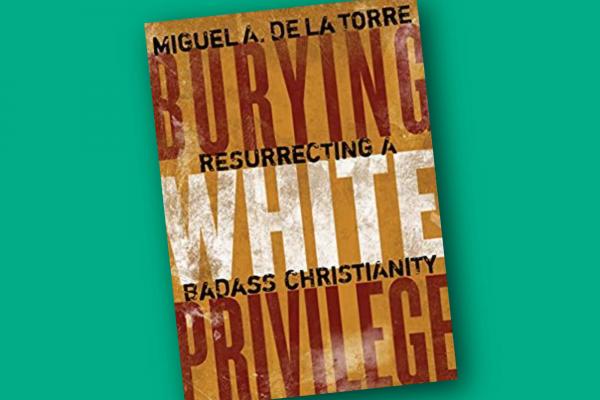WHITE EURO-AMERICAN Christianity is dying, according to Miguel A. De La Torre, and from his point of view, its death is necessary. It has distorted the gospel with Euro-American nationalist ideals that benefit white communities at the expense of communities of color—heretical beliefs grounded in fear and exclusion, rather than love. In Burying White Privilege: Resurrecting a Badass Christianity, De La Torre deconstructs Donald Trump’s abundant evangelical support. In doing so, he offers guidance on how Christians can move forward.
Whiteness lies, he explains. It lies about the superiority of particular beliefs and nations. And this superiority complex has led to a lot of violence being done under the name of Christianity, including displacement, slavery, and genocide.
To respond to it in a faithful and radical way, De La Torre proposes what he calls “Badass Christianity.” This Christianity emerges from the experiences of those on the margins of society but is for everyone, including those who have been oppressors and among the privileged. It’s focused on liberation, not merely beliefs and doctrines.
There is a connection, De La Torre states, between evangelicals’ belief in an authoritarian God, preference for an authoritarian minister, support for an authoritarian head of household, and, ultimately, their desire for an authoritarian president. Furthermore, it was not simply poor, rural white people who voted for Trump. In fact, white people from different socioeconomic backgrounds overwhelmingly supported him, due to shared prejudices.
In response, De La Torre encourages faithful Christians to kill and bury white Christianity—a process both white people and people of color must take up, since whiteness as a way of thinking, being, and viewing the world is damaging to each of them.
Burying White Privilege offers a relevant account of white Christianity in the U.S. and the needs of the groups it has marginalized for centuries. It is a moving description of how little has changed in our society for those who are oppressed. While De La Torre offers stern comments, they come from a place of genuine care and concern regarding the future of the church. Burying White Privilege emerges from De La Torre’s frustration and pain. It’s a lamentation for Christianity’s status in the U.S.
It also echoes the dissatisfaction that many Christians—particularly Christians of color—feel toward mainstream Christianity. For those who still don’t understand why Christianity in the U.S. is decaying, De La Torre explains why we should be concerned and why we need to work together, to build “a country that does not yet exist.”

Got something to say about what you're reading? We value your feedback!







